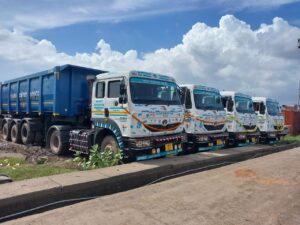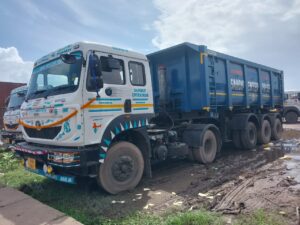Starting a trucking business can be a rewarding venture, but choosing the “right type of lorry” is essential for your success. With a multitude of options available, it can be overwhelming for newcomers to decide what suits their needs best. Are you looking to transport goods locally or across the country? Do you prefer a larger fleet or starting small? In this article, we’ll break down the various types of trucks suitable for different trucking business models, helping you make an informed decision that aligns with your goals.

Understanding Your Trucking Business Needs
When considering a trucking business, it’s important to understand the range of trucks available. Each type has its distinct features and advantages, catering to various cargo requirements:
1. Box Types ofTTrucks
Box trucks, often referred to as cube vans, feature a separate cabin and a large, enclosed cargo area. They are ideal for transporting furniture, appliances, and other bulk items.
- Capacity: Typically ranges from 10 to 26 feet.
- Benefits:
- Enclosed space protects items from weather.
- Loading and unloading are easier due to low floors.
- Ideal For: Local freight delivery, moving companies, and retail distribution.
2. Flatbed Types of Trucks
-

best for truck business. Flatbed trucks have a completely open cargo bed, making them suitable for hauling oversized or heavy loads that wouldn’t fit in an enclosed space.
- Benefits:
- Capacity: Can carry large items that are too big for boxed trucks.
- Benefits:
- Easier loading and unloading with cranes and forklifts.
- Versatile for various types of cargo including lumber, machinery, and equipment.
- Ideal For: Construction, landscaping, and heavy equipment transport.
3. Refrigerated Types ofTrucks
These trucks, equipped with cooling systems, are essential for transporting perishable goods. They play a crucial role in the food distribution industry.
- Capacity: Similar to standard box trucks but with refrigeration units.
- Benefits:
- Maintains temperature-sensitive cargo such as meats, dairy, and frozen foods.
- Regulatory compliance for transporting hazardous materials.
- Ideal For: Food service suppliers, grocery deliveries, and pharmaceuticals.
4. Cargo Vans
Cargo vans provide a compact and highly versatile option for trucking operations. They are smaller than box trucks but offer a significant amount of cargo space.
- Capacity: Ranges from 100 to 400 cubic feet.
- Benefits:
- Easy maneuverability in urban areas.
- Fuel-efficient compared to larger trucks.
-
Ideal For: Small businesses, courier services, and last-mile delivery.
Factors to Consider When Choosing Your Truck
Once you’re familiar with the different truck types, it’s time to consider several key factors that can impact your decision.
1. Business Objectives
Your trucking business’s goals will heavily influence your truck choice. Ask yourself the following questions:
- What types of goods do I plan to transport?
- Do I require refrigerated options for perishables?
- Is my focus on local deliveries or long-haul transportation?
2. Budget
The cost of the truck is a primary consideration. Trucks can vary significantly in price, and you must balance your budget with the features that meet your business needs.
- Purchasing New vs. Used: New trucks come with warranty benefits but can be expensive, while used trucks might require immediate maintenance.
- Leasing: A good option for those looking to minimize upfront costs, leasing offers flexibility.
3. Regulations
Different trucks are subject to various regulatory requirements, especially in the transportation of certain goods. Be aware of:
- Weight Restrictions: Certain roads and states impose weight limits on trucks.
- Licensing Requirements: A CDL (Commercial Driver’s License) may be necessary depending on truck class.
4. Operating Costs
The overall cost of ownership includes fuel efficiency, maintenance, and insurance. Assess the long-term costs to ensure your trucking business remains profitable.
- Fuel Efficiency: Look for trucks with better fuel economy to save on operating costs.
- Maintenance Records: Past maintenance can give insight into the reliability and potential future costs.
Conclusion: Making Your Decision
Choosing the right type of truck to start your trucking business is not just about picking a vehicle; it’s about aligning your choice with your business goals. By understanding the different truck options and their appropriate uses, considering essential factors like budget and regulations, you’ll be better positioned to make a choice that promotes the success of your venture.
Take a moment to reflect on your unique needs, and don’t hesitate to consult with industry experts or fellow trucking professionals. Remember, the right truck can make all the difference in establishing a profitable and sustainable trucking business.

